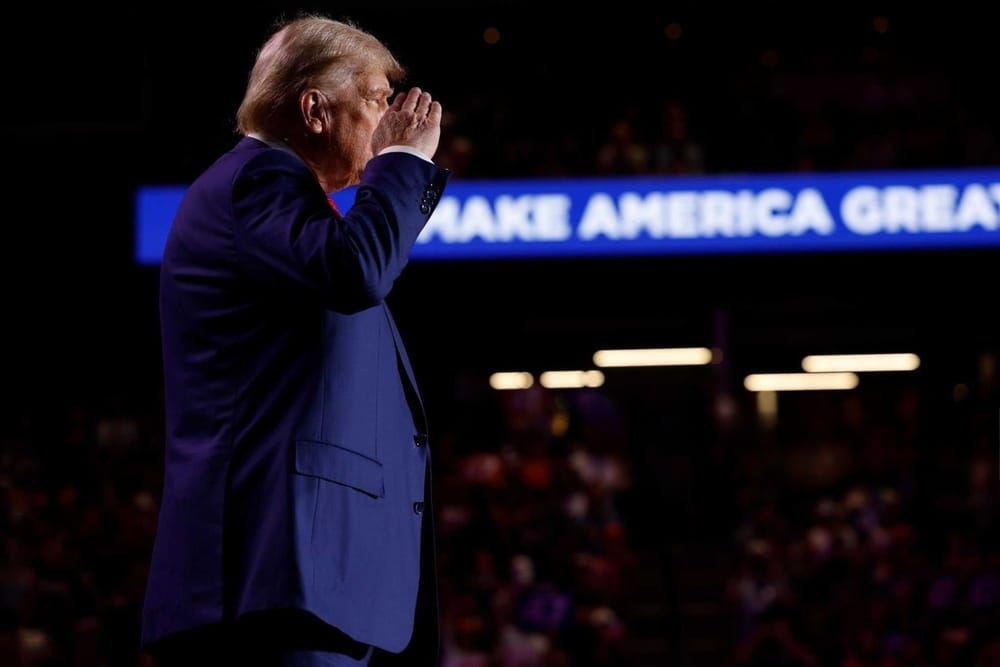
Donald Trump has threatened to slap massive tariffs on US imports of goods from BRICS nations. Photo: Anna Moneymaker/Shutterstock
As President Donald J. Trump embarks on his second term, early signals suggest a sharper focus on Latin America, a region he largely sidelined during his first four years in office. With migration and drug trafficking high on his agenda, his administration’s new priorities could redefine regional dynamics, directly impacting countries such as Brazil.
A vast ideological gulf separates Trump from Brazil’s leftist president, Luiz Inácio Lula da Silva. Yet as leaders of the two largest economies in the Western Hemisphere, they are bound to engage. Their contrasting worldviews almost guarantee friction, but pragmatism may necessitate an uneasy and unavoidable working relationship.
Trump’s approach to Latin America appears poised to be more assertive. His key appointments reflect this shift: Marco Rubio as secretary of state is expected to take a hard line against left-wing governments, while Mike Waltz, a staunch advocate of the Monroe Doctrine, supports military action against regional threats such as Mexican cartels.
Deputy Secretary of State Christopher Landau, a former US ambassador to Mexico, prioritizes curbing irregular migration, and Special Envoy for Latin America Mauricio Claver-Carone, the former head of the Inter-American Development Bank, has long pushed back against Chinese influence in the region. These choices signal an intensified US focus on hemispheric affairs.
For Brazil, the immediate focus may be elsewhere.
Trump’s policies will likely target Mexico, Venezuela, Cuba and Nicaragua first, applying economic and diplomatic pressure on those regimes. But as Brazil continues to deepen ties with China under Lula’s leadership, it could find itself caught in Washington’s crosshairs.
Clashes on trade and the environment
Trump’s return to the White House could undermine Lula’s climate ambitions, particularly on global deforestation and sustainability efforts. Trump’s skepticism of climate agreements — evidenced by his withdrawal from the Paris Agreement — directly challenges Brazil’s leadership on environmental issues.
Domestically, his policies could embolden Brazilian lobbies trying to chip away at environmental guardrails and weaken conservation efforts, accelerating deforestation in the Amazon.
Trade tensions may also escalate.
Trump has threatened steep tariffs on BRICS countries, including Brazil, and could retaliate against Brazilian trade barriers. His policies — centered on corporate tax cuts and higher import duties — may aim to boost American industry but could also stoke inflation and slow global growth, indirectly pressuring Brazil’s economy.
With the 2026 elections approaching, Lula faces a delicate balancing act: preserving economic recovery while managing the fallout from Washington’s shifting trade policies.
Yet, Brazil has largely escaped Trump’s economic ire. The US does not run a substantial trade deficit with Brazil (as it does with China, Mexico or Canada), reducing the likelihood of immediate punitive measures. This relative insulation offers Brasília a degree of leverage — an opportunity to navigate Trump’s trade wars with minimal damage, at least for now.
Pragmatism over confrontation
Despite the challenges, Brazil has room to maneuver. Trump’s rhetoric has already taken aim at the BRICS, accusing the bloc of undermining the US dollar’s dominance. If his administration turns this rhetoric into policy, Brazil could face additional strain.
To avoid becoming collateral damage, Lula’s government may need to tread carefully, emphasizing institutional diplomacy and strategic pragmatism.
Despite ongoing tensions, Brazil has an opportunity to shape its own brand of non-aligned pragmatism. By taking concrete steps, the country can demonstrate that it is not unconditionally tied to authoritarian regimes or beholden to Beijing’s economic agenda.
Last year, it refrained from joining China’s Belt and Road Initiative while maintaining a strategic dialogue with Beijing. Since last year, the country has raised levies on a wide range of imports from China — including iron, steel and fiber optics — as dumping complaints against Chinese exporters surge in Brazil.
A similar approach could work with Trump — one that avoids outright confrontation while preserving national interests. Lula, unlike his predecessor, Jair Bolsonaro, has no interest in a subservient relationship with Washington. Instead, he could leverage Brazil’s strategic importance to carve out an independent role on the global stage.
Regardless of who leads the US in the coming years, Washington’s ability to dictate terms in Latin America is diminishing. As emerging economies assert themselves, the old unipolar order is giving way to a more multipolar world.
If Brazil plays its cards right, it could expand its global influence — without becoming a casualty of Trump’s shifting priorities.








